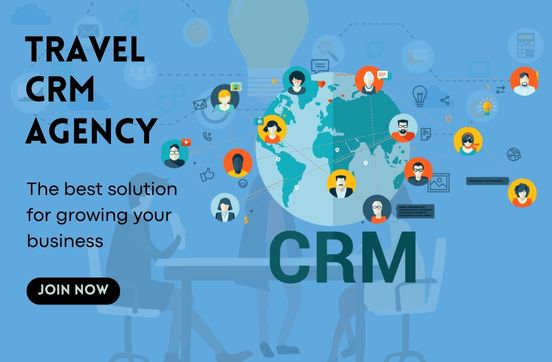
Urgent Need Of A Travel CRM: Common Features & Functionalities
A Travel CRM Software for Travel Agencies are meant to benefits and designed specifically for growth of businesses operating in the travel industry, such as travel agencies, tour operators, and hospitality providers.
It’s a CRM Software Solution tailored to address the unique needs and challenges of companies that deal with travel-related services and customers.
Key Aspects Of A Travel CRM: How It Helps?
A Travel CRM Software is a powerful tool that assists travel companies in managing their relationships with customers, improving efficiency in booking and planning, and enhancing the overall customer experience in the travel industry.
Reasons Every Travel Agency Should Have Travel CRM:
1. Customer and Lead Management: Travel Portal Services help companies organize and manage customer information, including contact details, preferences, past bookings, and interactions. This enables personalized communication and service.
2. Itinerary Planning: Many Travel CRMs offer features for creating and managing travel itineraries. This is particularly useful for travel agents and tour operators who need to plan complex journeys for their clients.
3. Booking and Reservations: They often include tools to facilitate booking flights, accommodations, transportation, and activities, helping to streamline the reservation process.
4. Invoicing and Payment Tracking: Travel CRMs may have invoicing capabilities, allowing businesses to send invoices to customers and track payments. This is vital for managing financial aspects of travel services.
5. Supplier Management: Managing relationships with suppliers, such as hotels and airlines, is crucial for travel businesses. B2B Travel Portal Provider can help in coordinating bookings and interactions with these partners.
6. Marketing and Campaigns: These systems may include marketing features like email campaigns, promotional mailers, and lead nurturing to engage with customers and generate new leads.
7. Reporting and Analytics: Travel CRMs often provide reporting tools to analyze key performance metrics, helping companies make data-driven decisions and improve their services.
8. Integration: They can integrate with other travel-related systems, such as Global Distribution Systems (GDS), online booking engines, and accounting software, to create a unified workflow.
9. User-Friendly Interface: Travel CRM Portal are designed to be user-friendly for travel agents and staff to quickly access and use customer information and booking details.
10. Compliance and Security: They often adhere to industry standards and regulations related to data security and privacy, which is critical when handling sensitive customer information.
In essence, it helps these businesses stay organized, provide personalized services, and ultimately drive growth and profitability.
Why Travel Companies Should Have A Proper Travel CRM?
Travel companies should have a proper Travel Customer Relationship Management (CRM) system for several important reasons:
Travel Companies Should Have A Proper Travel CRM:
1. Customer Data Management: Best Travel CRM allows companies to collect, organize, and manage customer data effectively. This includes contact information, preferences, booking history, and interactions. Having a centralized database of customer information enables travel companies to provide personalized services and marketing campaigns.
2. Personalization: Personalization is crucial in the travel industry. Travel CRM Software helps companies tailor their offerings to individual customer preferences. This can include suggesting destinations, accommodations, and activities based on past behavior and preferences, enhancing the customer experience.
3. Customer Communication: Travel CRM systems often include email marketing and communication tools. This allows travel companies to send targeted and timely messages to customers, such as special offers, travel tips, and booking confirmations. Effective communication can lead to increased customer loyalty and repeat business.
4. Streamlined Booking Process: With a CRM, travel companies can streamline the booking process. Agents can access customer data quickly, helping them assist customers in booking flights, hotels, tours, and other travel services more efficiently.
5. Lead Management: Travel Portal Solutions help manage leads and potential customers. Travel agents can track inquiries, follow up on quotes, and convert leads into bookings. This ensures that potential revenue opportunities are not lost.
6. Customer Support: Providing excellent customer support is essential in the travel industry. A travel CRM system can help agents track customer issues, inquiries, and complaints, ensuring that they are addressed promptly and effectively.
7. Analytics and Reporting: Travel CRMs often include reporting and analytics features. This allows companies to track key performance metrics, such as booking conversion rates, customer satisfaction, and revenue. These insights can inform decision-making and marketing strategies.
8. Inventory Management: For travel companies offering accommodations, transportation, and tours, a CRM can assist in managing inventory. It can help track availability, pricing, and reservations, preventing overbooking and ensuring accurate pricing.
9. Multi-Channel Integration: Many travel companies operate across multiple channels, including websites, social media, and mobile apps. Travel CRM Portal can help integrate customer data and interactions from these various channels, providing a unified view of the customer.
10. Competitive Advantage: In a highly competitive industry like travel, a well-implemented CRM can provide a significant competitive advantage. It allows companies to deliver better service, target the right customers, and make data-driven decisions to stay ahead of the competition.
11. Scalability: As travel companies grow, a scalable CRM system can grow with them. It can accommodate an increasing customer base and expanding product offerings.

Are You Planning To Grow Your Travel Business?
A proper Travel CRM is essential for travel companies to enhance customer relationships, improve operational efficiency, and stay competitive in the industry.
It helps in personalization, communication, data management, and overall customer satisfaction, which are critical factors for success in the travel business.
Ultimately, the Best Travel CRM will depend on your unique business requirements, goals, and resources. It’s a good idea to explore multiple options, request demos, and read reviews to make an informed decision.
helloGTX Travel CRM is a product of Catabatic Technology Pvt Ltd (one of the Best Travel CRM Agency where you get a all-in-one solution for all your travel website).
Frequently asked questions
1. What is the best travel CRM?
The Best Travel CRM can vary based on the specific needs, size, and preferences of a travel company. Different Travel CRM Software options offer various features, pricing structures, and integrations, so the choice ultimately depends on what aligns best with your company’s requirements.
Popular travel CRM that are considered the best:
1. Salesforce: Salesforce is a widely used CRM Platform that offers a range of customizable features. It can be tailored to suit the needs of travel companies, including lead management, customer data organization, communication tools, and integration options.
2. helloGTX CRM: helloGTX goes beyond being just a Travel Agency CRM Software, providing dynamic growth opportunities. Its comprehensive suite of integrated tools simplifies tasks such as customer and lead management, website and landing page creation, invoicing, supplier coordination, itinerary planning, promotional email campaigns, and much more, all with just a few clicks.
3. HubSpot CRM: HubSpot provides a user-friendly CRM that is suitable for small to mid-sized travel businesses. It offers contact management, email tracking, task management, and reporting capabilities. HubSpot’s CRM can be a good choice for companies looking to start with a free option and then scale up.
4. TravelContact: TravelContact is a CRM specifically designed for the travel industry. It offers features tailored to travel agents, such as itinerary planning, booking management, commission tracking, and supplier integration.
2. When selecting a travel CRM, which factors should we consider?
i. Features: Ensure that the CRM has the features relevant to your travel business, such as booking management, lead tracking, communication tools, and reporting.
ii. Scalability: Choose a CRM that can grow with your business as it expands.
iii. Integration: Check if the CRM integrates with other software you use, such as booking engines, marketing tools, and accounting systems.
iv. User Interface: The CRM should be user-friendly and easy for your team to learn and use.
v. Support: Look for a CRM provider that offers good customer support and resources for training and troubleshooting.
vi. Cost: Consider your budget and whether the CRM’s pricing structure aligns with your financial plans.
Recent Posts
- How does travel API Integration works for tour operators?
- Travel Business: Strategic Offline-to-Online Transition
- Skyrocket Your Sales and cutdown Manpower Costs with helloGTX!
- Increase Your Online Presence with Expert Travel Portal Development
- Unlocking New Heights in Travel Business with XML API Integration
- Transform Your Travel Business with Essential Travel Technologies
- Why the Travel Industry Requires an Effective Flight Booking System & Flight Booking Website Development
- B2B Travel Portal Development and B2C Travel Portal Development
- Enhance Your Travel Business with Via API Integration
- Best Travel CRM Software Agency In India 2024/2025
- Craft Captivating Itineraries & Impress Your Clients | helloGTX’s Itinerary Builder Software
- The Importance of Group Departure Package Management for Travel Agents
- Get Wings for Your Travel Business: Best Travel CRM Software
- Travel CRM and Travel APIs
- Your CRM, Now in Your Pocket: WhatsApp Chatbox API Integration
- Frequently Asked Questions Based On Travel API Integration
- Welcome to GTX Travel CRM – Your All-in-One Solution for Effortless Travel Management!
- ChatGPT – A Catalyst or Challenge for Travel Agents?
- Unleash the Power of GTX Travel CRM’s Itinerary Builder
- Better Outcome & Customer Engagement with IVR Integrated GTX Travel CRM
- What are The Travel Industry Requirements Now a Days?
- 7 Common Mistakes Travel Agents Does While Designing Their Holiday Website
- What Is The Best Travel CRM Software & Travel Solutions For Every New Or Established Travel Agency?
- Travel Software Technology – Latest Trends in Travel and Tourism Industry
- Advantages of Combining IVR (Interactive Voice Response) with Your CRM: Key To Customer Management
- Important Travel CRM Software FAQ’s: You Should Know & Choose The Right CRM
- Redefining Travel Planning with the Best Itinerary Builder Software Provider
- Frequently Asked Questions About Travel Portal
- Frequently Asked Questions About Travel CRM Software
- Urgent Need Of A Travel CRM: Common Features & Functionalities
- Key Aspects & Purposes Of API’s: Fly Hub API Integration Features
- Etrav API Integration: It’s Travel Services & Features
- API Integration Partners With helloGTX: Find Out How It Helps?
- Top 10 B2B Travel CRM Agencies & Travel Distribution Platforms in India
- Your Ultimate Travel Companion: helloGTX Travel Itinerary Builder Software
- The Best Travel CRM Software for Travel Agencies- 2023/24
- Basic Overview Of How Riya Travel API Integration Typically Works
- helloGTX partnering with TBO (Flight API Integration Partner)
- Why To Choose Travel CRM Software? Disclosing The Best Travel CRM Agency.
- How Flight API Integration Helps Establish Global Connectivity In The Travel Industry?
- Strategies to implement to drive more revenues with Flight API Integration with helloGTX
- Create a Travel Portal with TripJack or TBO API Integration: Reasons To Consider It
- How to Develop a Successful Business Plan for a Travel Agency Using helloGTX’s Travel CRM Software in 2023?
- helloGTX Offer’s The Best Hotel Booking API Integration
- Integrate Travel Itinerary Builder Software: The Perfect Itinerary For Your Travel Business
- Evaluating Fixed Departure Portals or Group Departure Portals: Challenges and Solutions
- How The Best Travel Agency CRM Helps Agents To Close Leads Faster?
- TBO API Integration: Endless Possibilities for Travel Businesses
- B2b Travel Portal Development: Empowering The Travel Industry With Technology
- 7 Reasons How B2b Travel Portal Can Benefit Travel Company?
- Do I Need a Travel CRM or How to Choose One?
- 4 Ways to Boost Your Online Travel Booking Sales with Our Travel Software
- 5 Reasons Why You Need A Travel Website For Your Travel Business
- How To Generate Quality Travel Leads?
- How Travel Companies can automate their B2B business with sub agents?
- 10 Ways helloGTX can Benefit Your Travel Business
- What is Travel CRM Software?
- It’s golden time to grow your travel business. Take Pride in What you DO !
- Value of Travel Agents Work is Under Pressure in this age of UBERization? What’s your thought?


